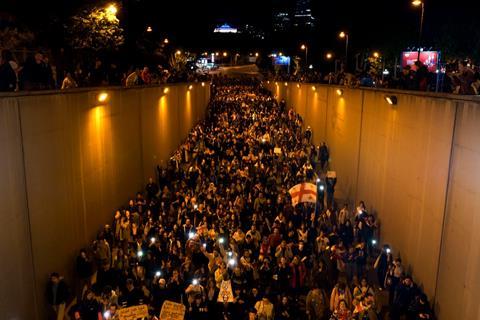
The Georgian Film Institute (GFI), the independent organisation created at the Berlinale last year, is attending EFM for the second time and is one of the signatories of a letter to the Berlinale organising committee, highlighting the “numerous [Georgian] film industry professionals [who] have been arrested, beaten, tortured, and unlawfully detained” by the pro-Russian Georgian government.
The list of those impacted includes actors Giorgi Nakashidze, who starred in the Oscar-nominated Tangerines, and Andro Chichinadze, whose credits include Cold Clouds, Hotel Tehran and The Resting Samurai.
The letter, also signed by Giorgi Shvelidze, executive director, Georgian Cinemgraphers Association, and Giga Bekauri, head of the Georgian Actors’ Guild, among others, draws attention to what is said is the ambiguous role of the Georgian National Film Center (GNFC) in the industry.
Centre staff, they alleged, are “not just supporters of this repressive regime” but also as “active enablers and promoters of its policies”.
“Creative freedom has been systematically dismantled, and even the fundamental right to resist is being stripped away,” the letter continued. “Georgian cinema is now experiencing political repression on an unprecedented scale in the history of independent Georgia.”
The GFI was aunched in 2024 as alternative to the GNFC.
But one issue now facing filmmakers is that without funding or administrative support from the national agency, they have nothing to bring to the table and are struggling to put coproductions together. “The Georgian Film Centre hasn’t announced any calls for production grants or minority coproduction funding. It means that no new projects are being funded,” one producer noted.
The GNFC has strongly disputed the charges against it. “The accusations against us are ridiculous,” a GNFC spokesperson told Screen. ”Those who are falsely making these claims are the same individuals who have been boycotting the Georgian National Film Center for more than a year and have not participated in our funding calls. Last year, we issued more than 10 calls, but the boycotting producers chose not to apply, effectively cutting ties with us themselves.
Several Georgian filmmakers attending International Film Festival Rotterdam last week said they did so in order to look for financing to fill the gap where promised GNFC funding has not come through. Producer Nino Chichua, who runs 1991 Productions with Anna Khazaradze in Tbilisi, is in post-production on Uta Beria’s feature Tear Gas. It won two of the main prizes at IFFR Pro awards. Chichua said GNFC is yet to transfer the second instalment of the grant Tear Gas was awarded “years ago”.
Georgian films are still being selected for festivals and coproduction markets - but Chichua warns that this will not last. “In a couple of years, I don’t think we will see that many Georgian films coming out any more. We are joking that we are working on the last Georgian films,” she stated.
One Georgian film in official selection in Berlin this year is Tiku Kobiashvili’s Inner Blooming Springs as a Forum Special. This is a documentary set during protests in Tbilisi against the so-called ’Foreign Agents’ law, the legislation targeting media organisations that receive more than 20% of their funding from abroad. The law was forced through by the pro-Russian Georgian Dream party in the face of widespread public opposition.
The fears of the filmmakers extend far beyond the problems they are experiencing with the GNFC.
“[It] is just a tiny part of the general issue and overall situation that is happening in Georgia, this corruption and nepotism,” said director Rati Oneli, who won a work-in-progress post-production award at IFFR for Wild Dogs Don’t Bite earlier this month. Censorship has been established in full force but now we are moving into a different era of repression [with] the arrests, the beatings and the disruption of basic freedoms. It is only getting worse,”






![The Brightest SunScreen[Courtesy HKIFF]](https://d1nslcd7m2225b.cloudfront.net/Pictures/274x183/3/5/0/1448350_thebrightestsunscreencourtesyhkiff_312678.jpg)


















No comments yet